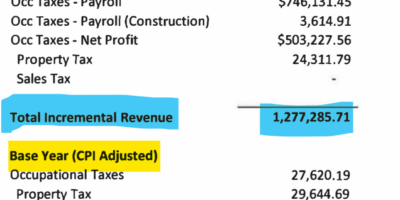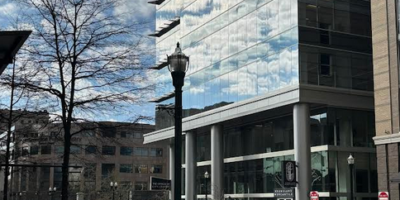By Beth Connors-Manke
On Thursday, March 17, foregoing their St. Patrick’s Day festivities, a group of 81 citizens attended the Urban County Council Meeting. These 81 citizens, members of BUILD, were there to support the Affordable Housing Trust Fund (AHTF).
On the docket that night was a presentation about the AHTF by Commonwealth Economics, a firm hired by the Council to study the fiscal, economic, and social impact of an AHTF in Lexington.
“Housing trust funds are dedicated sources of revenue to help low- and moderate-income people achieve affordable housing,” Commonwealth Economics writes in its report. “In most cases, a government agency — usually an existing housing agency — administers the housing trust fund and awards grants and loans to local governments, non-profit developers, for-profit developers, and, in some cases, individuals, for a variety of low- and moderate-income housing activities.”
The study found that a local AHTF would, on average, produce approximately 470 housing opportunities each year, along with 150 new construction jobs and 320 rehabilitation projects.
The research also found that “more than 363 new jobs will be directly and indirectly supported by trust fund investment.” Additionally, “more than $43.3 million of direct, indirect and induced economic activity will be generated from trust fund investment.”
Imagine that: working for equity can be good for Lexington socially and economically.
Veteran Action
These 81 citizens (and their BUILD brethren) are veterans of community involvement, in general, and advocacy for the AHTF, in particular. BUILD (Building a United Interfaith Lexington through Direct Action) began working on justice issues regarding housing as far back as 2007. In 2008 BUILD, with other organizations, proposed an AHTF to ameliorate some of the housing inequities in Lexington.
At BUILD’s request, in spring 2008 then-Mayor Newberry agreed to put together a taskforce on an AHTF. The commission, quick on its feet, issued a report by September 2008.
As its yardstick, the AHTF Commission defined affordable housing as “housing that requires families and individuals to pay no more than thirty percent (30%) of their income for housing and housing related costs.” Rent has increased twice as fast as wages, and rental costs will grow by 33% in the second half of this decade, according to the report. To put this in perspective: rents increased by 9% from 2000-2005. In its research, the AHTF Commission found that a two-bedroom apartment in Lexington on the average cost $533 in 2001. Last year the two-bedroom average was $775.
Of the rental households in Fayette County, more than 45% currently pay more than one-third of their gross household income on rent. This means that these households are not affordably housed. Worse yet, 18% of renter households pay more than half of their income for housing, leaving these neighbors in danger of becoming homeless, according to the Central Kentucky Homelessness and Housing Initiative.
For two years after he commissioned the report, then-Mayor Newberry publicly refused at BUILD’s annual Nehemiah Action to support the funding of the AHTF. Twice he told BUILD’s large assembly — and residents who benefit most from more affordable housing — “no.”
Believing in the necessity and the community benefit of a local AHTF, BUILD members and their allies have continued to champion the cause. At the March 17 council meeting, eight citizens testified to the need for an AHTF. One speaker, Mary Alice Pratt, held up what appeared to be Mayor Jim Gray’s campaign materials and, firmly but courteously, asked the mayor to remain true to his pre-election promises. Among the other speakers were three pastors from local churches as well as citizens from across the city. Councilmembers Chris Ford (first district) and Diane Lawless (third district) both spoke in support of the fund. Lawless affirmed that the AHTF would uplift not just individual families, but entire neighborhoods. As a member of the original commission, Ford has long been a proponent of the fund.
Broad Benefits
The proposed revenue stream for the AHTF is a local insurance tax. Commonwealth Economics analyzed three rates: a .5% increase, a .75% increase, and a 1% increase. By it’s estimates, the impact per household would be between $15 and $35 annually, depending on the rate of increase in the local insurance tax.
Acknowledging the potential negative aspects of an AHTF (the tax itself, administrative costs for the fund, and impacts on the insurance industry), the economic impact analysis found that the city’s investment in an AHTF had broad benefits. Not only would it yield economic stimulus in the construction industry (at an average 8:1 leverage ratio, it would yield “$24 million of annual direct spending on construction activities” and approximately 161 jobs), but it also would benefit related industries such as insurance and real estate.
And then there are the social benefits of securing affordable housing for our community.
In terms of health, the report found that “housing trust fund investment in both new construction projects and the rehabilitation of existing housing, which is often dilapidated and hazardous, has the potential to move Lexington families out of dangerous, unfit living situations.” By making housing more affordable, families can devote more of their budgets to nutritious food and health care. Better access to affordable housing can also reduce residential overcrowding, thereby limiting the spread of infectious disease.
The study also noted that “a stable and decent housing situation has been shown to play a major role in creating a much more conducive and positive environment in which to raise children.” In other words, affordable housing can also mean more stability for families, which can affect children’s education: “studies have continuously shown a strong correlation between the frequency of moves during childhood and below-average performance in school.” On a related note, affordable housing can allow the victims of domestic violence to escape abusive situations.
BUILD members have long been convinced of the value of investing in an AHTF, and now two reports, one commissioned by former-Mayor Newberry and now one presented by Commonwealth Economics to Mayor Gray and the Council, have also shown the broad benefits of an AHTF for the entire community.
Still Committed
At the March 17 council meeting, the Council agreed to send the AHTF to the Economic and Community Development Committee for further analysis and consideration. Firmly committed to the fund, BUILD has asked the Mayor and all Urban County Council members to attend the organization’s annual Nehemiah Action.
BUILD’s large assembly, the Nehemiah Action is where BUILD holds public officials accountable for justice in Lexington. Last year, more than 1,300 people attended the event. In addition to housing, this year BUILD has been working on issues related to health care for uninsured adults, youth with drug offenses in the court system, middle school suspension rates, payday lending, and access to employment for ex-offenders. Clearly, there’s lots of work for citizens to do here in Lexington. Roll up your sleeves.
BUILD invites all to attend this year’s Nehemiah Action, which will be held Monday, April 11, at Imani Baptist Church (1555 Georgetown Road). Doors open at 6:15 P.M., and the Action starts at 7 PM. It is recommended you arrive early and carpool, if possible. If you have questions, call the BUILD office at 859.367.0152.




Leave a Reply